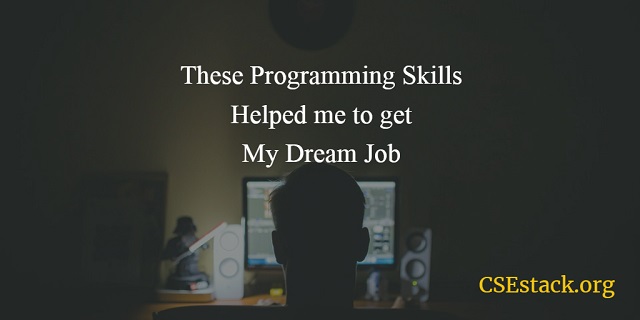Top 5 Computer Programmer Skills You Require to Land Better Jobs
Do you think, programmers are evaluated only according to the number of languages they can code in?
If you are thinking, you are WRONG.
Gone are those days.
While your programming language skills are the primary factor in landing a job, recruiters are looking for more than that in a potential employee.

Why are you required to improve and develop Special Computer programming skills?
Remember, most programming jobs are highly competitive. Always assume that other candidates have the same programming skills as you.
Your previous job experience should give you a considerable edge in a job hunt. But if you are a new programmer, your lack of experience could potentially work against you, even if you have the necessary academic qualifications.
When that is the case, think about which skills would give you an advantage in the hunt for a lucrative job offer.
It would help if you knew the qualities a company is looking for in a programmer.
You may be surprised to know that a business might seek qualifications other than the mastery of a particular set of programming languages.
5 Useful Computer Programmer Skills That Can Help You Land Better Jobs
Here is a list of these “other” skills and qualities employers look for in potential programmers that would give you a solid edge in your career:
1. Knowledge about Hardware
Modern programmers are expected to be well-versed in the software side of things. Most jobs won’t quiz you on your hardware knowledge.
Programmers are expected to know the very basics of hardware that you might have learned in Computer Science. Even if it’s not required, being knowledgeable about hardware can make you a better programmer and a better job candidate.
Though not necessary, it certainly helps to know the hardware side of a system when programming anything.
Why do you need Hardware knowledge to become a great Programmer?
Sanjay Ghemawat, the legendary software engineer at Google, famously wrote a list called “Latency Numbers Every Programmer Should Know.” Most of the numbers in this list come from hardware rather than software, such as how long it takes to execute an L1 cache reference.
Employers may use such hardware knowledge to distinguish between good programmers and great programmers.
Where Do You Need Hardware Knowledge while Programming?
- As a programmer, you don’t need to learn about computer organization and architecture (COA), unless you work on programming devices.
- However you should hone your knowledge regarding how memory and CPUs work.
- When you work with large data sets, knowing how multi-threaded operations work among multiple cores certainly helps. Learn how the thread is different from the process.
Even doing some light reading on these subjects can help you impress a potential employer.
Don’t be intimidated by the subject. You don’t need to know as much as a hardware engineer. However, you need to have some basic hardware knowledge.
For example, what would a programmer need to know about hardware when buying a new computer? Learning to solve the most common IT hardware issues can certainly come in handy.
2. Experience in Solving Real-World Problems
One of the crucial computer programmer skills employers look for in programmers is their ability to find solutions to real-world problems.
Why Programmer should have Real-World problem-solving skills to get a Job?
A business would be dealing with many of these that they hope AI-powered software can solve.
Therefore, when an employer looks at your job experience, they will most likely focus on the type of projects you have worked on.
Some programmers, even those with prior professional experience, may not have necessarily worked on the type of cool projects that woo recruiters.
What if you don’t have the required Skills for a Job?
Don’t despair if this describes your situation. You can make up for the lack of professional project experience with a personal one.
You can certainly present your personal pet projects as evidence of your programming skills at a job interview.
So don’t be afraid to take on a side project that inflames your passions.
You can not simply start developing a personal project. Choose your programming language. You can choose the highest-paying programming language. Or, if you are new to programming, choose the easiest programming language to learn.
Start with practicing simple coding questions before starting your personal project.
Make sure that this project somehow solves, or attempts to solve, a real-world problem. Track your progress on GitHub so employers can look at what you have done.
A personal project is a great way to showcase your organizational skills as well.
Among equally qualified job candidates, employers would always favor candidates with better organizational and management skills.
It would show that you can methodically tackle a complex project without running into problems of your own creation.
3. Good Grasp of “Soft Skills”
Why do you need Soft Skills to get a Job Offer?
Programmers who work at companies are no longer lone wolves. You will be expected to work in large groups, which would often consist of non-programmer colleagues.
A programmer who doesn’t know how to interact in such an environment, no matter how skilled, would not get hired.
This is why mastering so-called “soft skills” can make you stand out as a programmer.
Two Types of Soft Skills:
- Soft skills refer to your ability to interact interpersonally with other people on the team. These include aspects like the ability to communicate well, navigate conflict, and generally how well you can get along with others.
- Soft skills also refer to personal management abilities, such as time management.
How Can You Improve or Work on Your Soft Skills?
Most programmers run into trouble in the communications department. If you have trouble articulating your thoughts, try taking a public speaking course online for free.
Learn to talk in a charismatic manner that makes you seem likable. Additionally, you need to hone your skills at translating tech jargon into terms the marketing team can understand.
You can show off your interpersonal skills by working on projects with other people. Taking on a coaching or mentoring program is also a great start.
Work with young people or budding programmers in an educational environment. If you are tolerable as a teacher, then employers will know that you are a pleasant and likable employee.
4. Being Part of the Community
Do you love to program from your basement?
Employers prefer programmers who are part of the professional community. That is to say, any contributions to open-source code and experience working with other programmers on non-profit projects would indicate that you are very much part of the programming community.
Don’t confuse being part of the community with being a famous programmer. Rather, this refers to how well you exchange ideas with other programmers.
How Can Be Part of the Community Help You Landing Job?
If you publish academic papers, launch group projects, or speak at conferences, this would indicate that you are a community-minded programmer.
Being known in this way would certainly boost your resume and chances of getting hired.
5. Knowledge about the Business Side of Things
As a programmer, you are expected to program. However, modern businesses would prefer programmers who understand how their projects relate to the overall business operations of the company.
This is not to say that you need a business degree or even any professional knowledge about business. Rather, employers would be impressed if you understood their company’s business model on a basic level.
Why do You Need Business Side Knowledge to Become a Better Programmer?
As mentioned above, programmers today work in teams that often involve management, marketing, and communications. The aim is to work toward a particular business goal.
Being able to understand that goal would make a programmer a valuable employee.
When you don’t know what the company is trying to do, it would affect your work and your ability to be part of the team.
For Example “Google”:
Think about a company like Google.
Programmers working for Google are expected to be skilled in their field but are also expected to understand the business model of Google.
Understanding how search drives ad revenue is necessary for these programmers to create effective code.
When you work at any other company, your expectations will be similar.
How to Search Programming Job Effectively?
As the competition is increasing day by day, you need to follow the most effective job search technique.
If you are looking for a job or attending any drive, go through all the previous interview questions asked.
Along with the above-mentioned skills, also improves the qualities required for a software developer.
Finally,
As you can see, having additional skills as a programmer in the current job market is essential.
Dedicate some time to improving your abilities and skills in the above-mentioned areas. Doing so would instantly make you a better job candidate.
What other computer programmer skills do you think can improve your programming to become successful in your career?
 Do you want me to send you programing updates for FREE?
Do you want me to send you programing updates for FREE?
Thanks for sharing the detail point of view.
I liked the explanation of the following points:
– Experience in Solving Real-World Problems
– Knowledge about the Business Side of Things
You’re welcome!
And Thanks, Debasish for sharing your thought about this article.
No, I never thought that so. May be that’s what you thought, to raise up that question?
I used different languages to leverage the libraries support and the power that comes with each.
To fill you in…
Can you use Java to run native Python Pandas? Numpy? Scikit-learn?
Why Android only support Java, Kotlin, React Native/Node?
Is Python not for Android?
Have you ever tried to do Elastic search with SQL?
Do you know why people use No-SQL instead? etc.
Your answer to these questions depend on your objectives.
Hi, Senh! I agree that we need different programming languages to accomplish different objectives.
Now, look at recruiters point of you. If the start-up is hiring a candidate for their data science requirement, they will not bother if you know Android development or not. (Having Android skill is always good, but sometimes it depends on the companies requirement).
If the candidates have all the required skill for data science, the recruiter might interested in knowing your other skills like problem solving ability, your presentation skills rather than your Android development skills.
For a programmer, programming is the first choice, but there are some other soft skills can give you an edge over other candidates.
That’s what I mean.
Thank you so much Aniruddha for the advice.
I will surely take it into consideration.
You’re welcome, AINOMUGISHA! Best wishes…